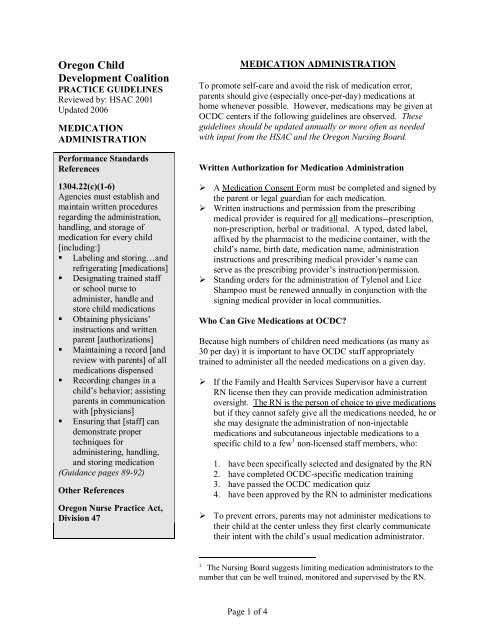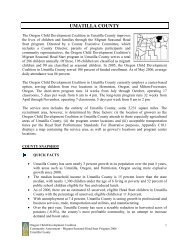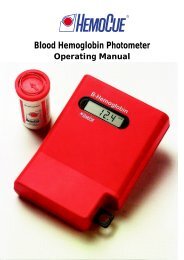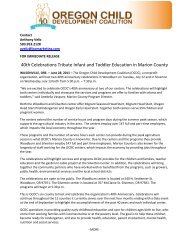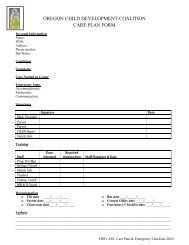Medication Administration - OCDC
Medication Administration - OCDC
Medication Administration - OCDC
Create successful ePaper yourself
Turn your PDF publications into a flip-book with our unique Google optimized e-Paper software.
Oregon Child<br />
Development Coalition<br />
PRACTICE GUIDELINES<br />
Reviewed by: HSAC 2001<br />
Updated 2006<br />
MEDICATION<br />
ADMINISTRATION<br />
Performance Standards<br />
References<br />
1304.22(c)(1-6)<br />
Agencies must establish and<br />
maintain written procedures<br />
regarding the administration,<br />
handling, and storage of<br />
medication for every child<br />
[including:]<br />
• Labeling and storing…and<br />
refrigerating [medications]<br />
• Designating trained staff<br />
or school nurse to<br />
administer, handle and<br />
store child medications<br />
• Obtaining physicians’<br />
instructions and written<br />
parent [authorizations]<br />
• Maintaining a record [and<br />
review with parents] of all<br />
medications dispensed<br />
• Recording changes in a<br />
child’s behavior; assisting<br />
parents in communication<br />
with [physicians]<br />
• Ensuring that [staff] can<br />
demonstrate proper<br />
techniques for<br />
administering, handling,<br />
and storing medication<br />
(Guidance pages 89-92)<br />
Other References<br />
Oregon Nurse Practice Act,<br />
Division 47<br />
MEDICATION ADMINISTRATION<br />
To promote self-care and avoid the risk of medication error,<br />
parents should give (especially once-per-day) medications at<br />
home whenever possible. However, medications may be given at<br />
<strong>OCDC</strong> centers if the following guidelines are observed. These<br />
guidelines should be updated annually or more often as needed<br />
with input from the HSAC and the Oregon Nursing Board.<br />
Written Authorization for <strong>Medication</strong> <strong>Administration</strong><br />
‣ A <strong>Medication</strong> Consent Form must be completed and signed by<br />
the parent or legal guardian for each medication.<br />
‣ Written instructions and permission from the prescribing<br />
medical provider is required for all medications--prescription,<br />
non-prescription, herbal or traditional. A typed, dated label,<br />
affixed by the pharmacist to the medicine container, with the<br />
child’s name, birth date, medication name, administration<br />
instructions and prescribing medical provider’s name can<br />
serve as the prescribing provider’s instruction/permission.<br />
‣ Standing orders for the administration of Tylenol and Lice<br />
Shampoo must be renewed annually in conjunction with the<br />
signing medical provider in local communities.<br />
Who Can Give <strong>Medication</strong>s at <strong>OCDC</strong>?<br />
Because high numbers of children need medications (as many as<br />
30 per day) it is important to have <strong>OCDC</strong> staff appropriately<br />
trained to administer all the needed medications on a given day.<br />
‣ If the Family and Health Services Supervisor have a current<br />
RN license then they can provide medication administration<br />
oversight. The RN is the person of choice to give medications<br />
but if they cannot safely give all the medications needed, he or<br />
she may designate the administration of non-injectable<br />
medications and subcutaneous injectable medications to a<br />
specific child to a few 1 non-licensed staff members, who:<br />
1. have been specifically selected and designated by the RN<br />
2. have completed <strong>OCDC</strong>-specific medication training<br />
3. have passed the <strong>OCDC</strong> medication quiz<br />
4. have been approved by the RN to administer medications<br />
‣ To prevent errors, parents may not administer medications to<br />
their child at the center unless they first clearly communicate<br />
their intent with the child’s usual medication administrator.<br />
1 The Nursing Board suggests limiting medication administrators to the<br />
number that can be well trained, monitored and supervised by the RN.<br />
Page 1 of 4
Oregon Child<br />
Development Coalition<br />
PRACTICE GUIDELINES<br />
MEDICATION<br />
ADMINISTRATION<br />
(Continued)<br />
Other References<br />
(continued)<br />
Oregon Revised Statutes<br />
433.800-830<br />
<strong>OCDC</strong> Care Plan<br />
Development Practice<br />
Guidance<br />
<strong>OCDC</strong> Training Summary and<br />
<strong>Medication</strong> Forms<br />
‣ The RN who originally delegated medication administration<br />
has the authority to rescind delegation (to withdraw<br />
permission to administer medications) at any time.<br />
‣ If no RN is on staff, the Family and Health Services<br />
Supervisor and Program Director must have a contract with a<br />
medication administrator that must be a RN or a licensed<br />
health provider. The medication administrator will oversee<br />
medication administration, including designation, training,<br />
monitoring and consultation as needed. The contracted<br />
medication administrator must provide proof of liability<br />
insurance coverage and a current license.<br />
<strong>Medication</strong> <strong>Administration</strong> Training<br />
<strong>OCDC</strong> <strong>Medication</strong> <strong>Administration</strong> Training Must Include<br />
1. Review of <strong>OCDC</strong> <strong>Medication</strong> <strong>Administration</strong> Guidelines<br />
2. The “Five R’s” of giving medication (right medication, right<br />
dosage, right child, right time, right route)<br />
3. What to check before giving medications<br />
(Five R’s, allergies, parental permission, and written<br />
orders/permission from the prescribing medical provider)<br />
4. Proper medication storage and transportation<br />
5. <strong>Medication</strong> administration (hygiene, measurement, how to<br />
administer oral, eye, ear medications, salves, inhalants,<br />
subcutaneous injectables, and lifesaving treatments)<br />
6. Common childhood illnesses treated with medications<br />
7. <strong>Medication</strong>s commonly given at <strong>OCDC</strong><br />
8. Potential side effects<br />
9. How to read prescription labels and define abbreviations<br />
10. Reasons why providers and parents should be notified after<br />
medication has begun, and who and when to call<br />
11. Parent-Center-Provider communication about medications<br />
12. <strong>OCDC</strong> medication administration documentation rules and<br />
how to complete <strong>OCDC</strong> forms<br />
13. Demonstration and return demonstration of medication<br />
administration skills<br />
14. <strong>Medication</strong> <strong>Administration</strong> Quiz<br />
The medication administrator who conducts the training must<br />
ensure that the group size allows adequate interaction with each<br />
participant and an effective evaluation of each individual’s<br />
demonstration of knowledge/skills.<br />
Documentation<br />
Every medication given must be immediately and accurately<br />
documented. See guidance related to <strong>Medication</strong> <strong>Administration</strong><br />
Logs.<br />
Page 2 of 4
Oregon Child<br />
Development Coalition<br />
PRACTICE GUIDELINES<br />
MEDICATION<br />
ADMINISTRATION<br />
(Continued)<br />
Monitoring <strong>Medication</strong> <strong>Administration</strong><br />
The medication administrator is responsible for monitoring and<br />
documenting the performance of all medication administrators at<br />
least every 60 days. Monitoring of medication administration<br />
skills should include:<br />
1. Random review of medication documentation<br />
2. Observation of administration techniques<br />
3. Review any errors, incidents, or questions<br />
“P.R.N.” pro re nata <strong>Medication</strong>s (to be given as needed)<br />
The administration of p.r.n. medications may be assigned to an<br />
unlicensed caregiver by the medication administrator. Detailed<br />
written parameters must be in place to clarify the physician’s or<br />
nurse practitioner’s p.r.n. order and leaves guidelines which are so<br />
specific that the unlicensed caregiver uses no discretion in<br />
administering the p.r.n. medication. Teachers should be informed<br />
of the signs and symptoms that indicate the medication is needed.<br />
Delegation of Special Tasks of Client/Nursing Care (including<br />
the administration of subcutaneous injectable medications):<br />
The medication administrator who originally delegated<br />
medication administration will delegate specific to one child after<br />
completing the following conditions:<br />
(a) Perform a nursing assessment of the [child’s] condition:<br />
(b) Determine that the [child’s] condition is stable and<br />
predictable prior to deciding to delegate;<br />
(c) Consider the nature of the task, its complexity, the risk<br />
involved and the skills necessary to safely perform the<br />
task;<br />
(d) Determine whether or not an unlicensed person can<br />
perform the task safely without the direct supervision of a<br />
RN;<br />
(e) Determine how often the [child’s] condition needs to be<br />
reassessed;<br />
(f) Evaluate the skills, ability, and willingness of the<br />
unlicensed person;<br />
(g) Provide initial direction by teaching the task of nursing<br />
care, including:<br />
i. The proper procedure/technique<br />
ii. Why the task is necessary<br />
iii. The risk associated with the task<br />
iv. Anticipated side effects<br />
Page 3 of 4
Oregon Child<br />
Development Coalition<br />
PRACTICE GUIDELINES<br />
MEDICATION<br />
ADMINISTRATION<br />
(Continued)<br />
v. The appropriate response to untoward or side<br />
effects<br />
vi. Observations of the [child’s] response<br />
vii. Documentation of the task<br />
(h) Observe the unlicensed persons performing the task to<br />
ensure that they perform the task safely and accurately.<br />
(i) Leave procedural guidance for performance of the task for<br />
the unlicensed persons to use as a reference, [including:]<br />
i. Specific outline of how the task is to be<br />
performed, step-by-step;<br />
ii. Signs and symptoms to be observed; and<br />
iii. Guidelines for what to do if signs and symptoms<br />
occur.<br />
(j) Instruct the unlicensed persons that the task being<br />
taught and delegated is specific to this [child] only and<br />
is not transferable to other [children] or taught to<br />
other care providers<br />
Lifesaving Treatment<br />
The administration of epinephrine (for severe allergic reaction) or<br />
glycogen (for severe hypoglycemia) may be required in case of<br />
emergency in an <strong>OCDC</strong> center. Pursuant to ORS 433.800-830,<br />
Epinephrine and Glycogen are the only two intramuscular<br />
injections that may be delegated from a licensed medical<br />
professional to an unlicensed caregiver.<br />
<strong>OCDC</strong> staff must have been properly trained in the delegation of<br />
special tasks of client/nursing care (see above) before<br />
administering lifesaving treatment. In addition, a written care<br />
plan must be in place for any child who has been prescribed a<br />
lifesaving treatment (See Care Plan Practice Guideline).<br />
If a <strong>Medication</strong> Error Occurs<br />
‣ A <strong>Medication</strong> Error Report must be completed and signed by<br />
the medication administrator within 24 hours.<br />
‣ The person who made the error must sign the report and add<br />
his or her narrative account of what occurred.<br />
‣ The report must be submitted to the Program Director, who<br />
should keep a copy (confidentially) filed and send a copy to<br />
the Human Resources Director to be (confidentially) filed.<br />
‣ The event must be documented in the child’s file, including<br />
the name of the medication, side effects the child experienced,<br />
instructions or information given to parents, medical provider<br />
response, and any follow-up necessary.<br />
‣ The child’s parent or legal guardian must be notified of the<br />
event as soon as possible. The Family and Health Services<br />
Supervisor/<strong>Medication</strong> Administrator and Program Director<br />
will decide who is the most appropriate person to inform the<br />
parents.<br />
Page 4 of 4


